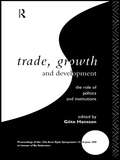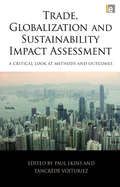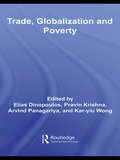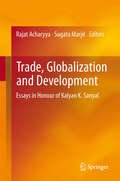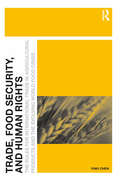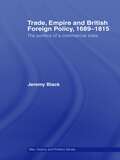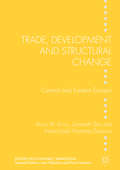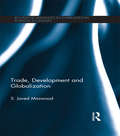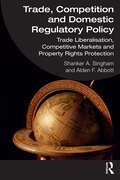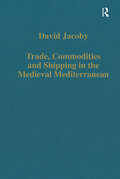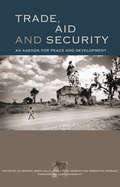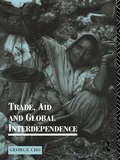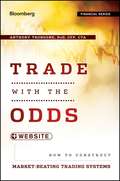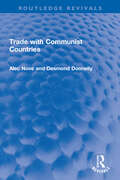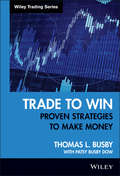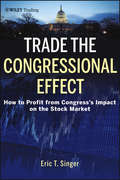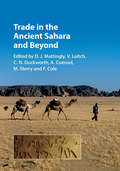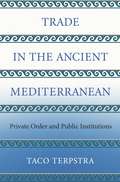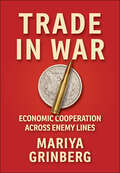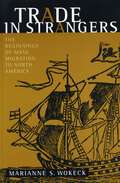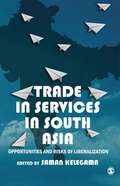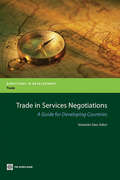- Table View
- List View
Trade, Growth and Development: The Role of Politics and Institutions
by Göte HanssonSince the end of the second world war the economic gap between rich and poor countries has steadily widened. Trade, Growth and Development examines this disparity and assesses the reasons why some developing countries have been more successful than others. The book is divided into four parts: Part I examines recent developments in the theory of trade, growth and economic development; Parts II to IV present an empirical analysis of policy and performance in Latin America, Asia and Africa. As well as offering an analysis of traditional economic factors the book also emphasises the role of politics and institutions in the process of economic development.
Trade, Globalization and Sustainability Impact Assessment: A Critical Look at Methods and Outcomes
by Paul Ekins Tancrede VoituriezTrade liberalization, as promoted by the World Trade Organization (WTO), has become one of the dominant drivers and most controversial aspects of globalization. Trade sustainability impact assessments (SIAs) were introduced as a means of generating better understanding especially of the social and environmental impacts of trade liberalisation, and of making those impacts more consistent with sustainable development. This book takes a hard look at the experience of Trade SIAs to date, and the extent to which they have achieved their objectives and improved the outcomes of trade negotiations. It proposes several ways in which Trade SIAs could be made more effective, and illustrates these in respect of controversial sectors in which trade liberalisation has been implemented or proposed, including commodities, services and investment. Finally the book makes proposals beyond SIA through which some of the conflicts between trade liberalization and sustainable development could be more effectively addressed. Written by top researchers and experts on trade SIAs, this book is vital for researchers, academics, post-graduate students and policy makers working on any aspect of impact assessment, international trade or globalisation more generally. In addition, the book will provide a particularly useful background for those considering how the environment and trade interrelate at both global and regional levels, with some particular insights on climate change and trade policies.
Trade, Globalization and Poverty (Routledge Studies In International Business And The World Economy Ser. #Vol. 40)
by Kar-Yiu Wong Arvind Panagariya Pravin Krishna Elias DinopoulosAn outstanding work, written to celebrate the seventieth birthday of Jagdish Bhagwati; the foremost defender of free trade and its role in developing economies in the world today, this rigorously academic and critical volume represents an important contribution to the understanding of many aspects of globalization. The editors, affiliated with four
Trade, Globalization and Development: Essays in Honour of Kalyan K. Sanyal
by Sugata Marjit Rajat AcharyyaThis book was written in honour of Professor Kalyan K. Sanyal, who was an excellent educator and renowned scholar in the field of international economics. One of his research papers co-authored with Ronald Jones, entitled "The Theory of Trade in Middle Products" and published in American Economic Review in 1982, was a seminal work in the field of international trade theory. This paper would go on to inspire many subsequent significant works by researchers across the globe on trade in intermediate goods. The larger impact of any paper, beyond the number of citations, lies in terms of the passion it sparks among younger researchers to pursue new questions. Measured by this yardstick, Sanyal's contribution in trade theory will undoubtedly be regarded as historic. After completing his Ph.D. at the University of Rochester he joined the Department of Economics at Calcutta University in the early 1980s and taught trade theory there for almost three decades. His insights, articulation and brilliance in teaching international economics have influenced and shaped the intellectual development of many of his students. After his sudden passing in February 2012, his students and colleagues organized a symposium in his honour at the Department of Economics, Jadavpur University from April 19 to 20, 2012. This book, a small tribute to his intellect and contribution, has been a follow-up on that endeavour, and a collective effort of many people including his teachers, friends, colleagues and students. In a nutshell it discusses intermediation of various kinds with significant implications for market integration through trade and finance. That trade can generate many non-trade-service sector links has recently emerged as a topic of growing concern and can trace its lineage back to the idea of the middle product, a recurring concept in Prof. Sanyal's work.
Trade, Food Security, and Human Rights: The Rules for International Trade in Agricultural Products and the Evolving World Food Crisis
by Ying ChenMost scholars attribute systemic causes of food insecurity to poverty, human overpopulation, lack of farmland, and expansion of biofuel programs. However, as Chen argues here, another significant factor has been overlooked. The current food insecurity is not absolute food shortage, since global food production still exceeds the need of the entire world population, but a problem of how to secure access to resources. Distorted agricultural trade undermines world food distribution, and uneven distribution impedes people’s access to food, particularly in poor developing countries. Examining EU and US agricultural policies and World Trade Organization negotiations in agriculture, the author argues how they affect the international agricultural trade, claiming that current food insecurity is the result of inequitable food distribution and trade practices. The international trade regime is advised to reconcile trade rules with the consideration of food security issues. Several other enforceable solutions to reduce world hunger and malnutrition are also advanced, including national capacity building, the improvement of governance, and strategic development of biofuel programs. This book will be of great interest to agricultural trade professionals and consultant policy makers in the EU, US and developing countries. Students and researchers with a concentration on international trade, agriculture economics, global governance and international law will benefit greatly from this study.
Trade, Finance, Specialization, and Synchronization
by Jean ImbsA report from the International Monetary Fund.
Trade, Empire and British Foreign Policy, 1689-1815: Politics of a Commercial State (War, History And Politics Ser.)
by Jeremy BlackThis new volume examines the influence of trade and empire from 1689 to 1815, a crucial period for British foreign policy and state-building.Jeremy Black, a leading expert on British foreign policy, draws on the wide range of archival material, as well as other sources, in order to ask how far, and through what processes and to what ends, foreign p
Trade, Development and Structural Change: Central and Eastern Europe (Studies in Economic Transition)
by Anca M. Voicu Somnath Sen Inmaculada Martinez-ZarzosoThis book examines the evolution of trade and trade patterns in Central and Eastern European countries (CEEC) and assesses the implications of these patterns on structural change and economic development within transition economies. Taking the fall of the Iron Curtain in 1989 as a starting point, the authors discuss the transition of former communist CEE countries from centrally planned to market-driven economies, arguing that trade was the primary engine for the economic growth and transition process they experienced. The chapters in this book incorporate the results of previous studies – some of which are based on original research conducted by the authors – dedicated to the integration process of international and European trade. More importantly, the authors look at the broader aspects of structural change and economic development, indeed the whole process of economic transformation. Thus, the book moves well beyond the core ‘trade and growth’ framework to look at technological progress, foreign investment, institutional development and structural change in Central and Eastern European countries.
Trade, Development and Globalization (Routledge Advances in International Political Economy)
by Syed Javed MaswoodThis book provides a longitudinal study of developing country involvement in multilateral trade negotiations. The trade regime established at the end of the Second World War did not cater for, and in some cases excluded, the developmental interests of the newly independent countries. This book offers a detailed analysis of: The first attempts to revise the trade regime in the 1960s through the United Nations Conference on Trade and Development and the formation of the Group of 77 to enhance their bargaining potential. The mixed coalition strategy, with the Cairns Group in the Uruguay Round of GATT. The new bargaining coalition, the Group of Twenty, that took on a much more confrontational and assertive bargaining position in the unsuccessful Doha round of the World Trade Organization. In part two, the author explores the possibility that economic globalization may finally deliver to developing countries what they had failed to achieve in five decades of multilateral negotiations - an opportunity to climb the industrialization ladder and achieve development. The book offers a proposal for revising the format of trade negotiations in a way that helps overcome stalemates and deadlocks. Trade, Development and Globalization will be of interest to students and scholars of international trade, trade and development, negotiation, global governance, political economy, international relations and economics.
Trade, Competition and Domestic Regulatory Policy: Trade Liberalisation, Competitive Markets and Property Rights Protection
by Shanker A. Singham Alden F. AbbottTrade, Competition and Domestic Regulatory Policy presents a unique combination of analysis of both international trade and investment policies, and competition and regulatory policies. Increasingly, policymakers, businesses and the law and economics professions need to better understand how changes and policy developments in international trade and competition developed and how their interaction impacts on global business. In addition to providing a comprehensive analysis of the attempts of international trade theory and practice to deal with tariffs, non-tariff barriers, market distortions and failures to protect various kinds of property rights, this book contains a detailed treatment of how property rights protection, including intangible property rights are a critical element of ensuring open trade and competitive markets. It examines how these rights have developed over time, and how they have been integrated into trade and competition policy. This book will be of significant interest to students of international business, professors of economics, law and business, and policymakers at the intersection of trade, investment, competition and property rights.
Trade, Commodities and Shipping in the Medieval Mediterranean (Variorum Collected Studies)
by David JacobyThis fourth collection by David Jacoby focuses on Western economic expansion the Eastern Mediterranean during the 11th-15th centuries. He is concerned to emphasize the interconnections linking the West, Byzantium and the Levant, and to examine normative sources for commercial activity (charters, etc.) against the background of actual practice, such as reflected in notarial documents. The articles deal with the evolution of urban centres, the trade in raw materials, and at the same time questions of technology transfer and the mobility of merchants and craftsmen. Particular attention is given to the silk trade: the author argues that demographic expansion in the Byzantine world, as in the West, stimulated economic growth, and demand for silk led to the emergence of a market-driven industry in Byzantium.
Trade, Aid and Security: An Agenda for Peace and Development
by Oli Brown'A compelling contribution to our evolving understanding of the links between trade, aid and security ? and what the international community needs to do to ensure peace and development in the world.' Achim Steiner, Executive Director, United Nations Environment Programme 'For far too long the international community ahs stood by while countries around the world descend into conflict and anarchy. We need to understand how we can engage more effectively with fragile and failing states. Trade, Aid and Security is an important step in this direction.' Jan Pronk, Special Representative of the UN General Secretary in Sudan and Former Minister of Development and the Environment, The Netherlands. 'As we begin to contemplate what the post-Iraq world will look like it is vital that we reflect on the limits of the utility of hard power and the importance that development can play in avoiding failed states before they fail, preventing conflicts and more successfully re-building states. This timely book makes a most important contribution to that process.' Lord Paddy Ashdown, UN High Representative for Boznia and Herzegovina, 2002 ? 2006 Leader of UK Liberal Democrat Party, 1988 ? 1999 'As UN Special Representative to the Great Lakes Region of Africa I have seen the devastating impact of the trade in ?conflict resources? with my own eyes. Amongst much else, this book shows how different trade and aid politics can tackle the trade in conflict resources and make a real contribution to secure societies. It is essential reading.' Mohamed Sahnoun, Special Representative of the UN Secretary General in Central and East Africa. Iraq, Afghanistan, Darfur. All resonate loudly on the international stage, exposing and illustrating the intractable links between global security, control over naturals resources ? be it oil, water, timber or 'conflict diamonds' ? and the manipulation of foreign aid and international trade policy. This volume, written by leading authorities from across the globe, introduces the linkages between trade, aid and security, and exposes how inappropriate or misused trade and aid policy can and do undermine security and contribute to violence and the disintegration of national states. On a practical level they demonstrate how six key areas of trade and aid policy can be used to help forge stability and security, reduce the likelihood of armed conflict, and assist economic and political recovery in our war-torn world.
Trade, Aid and Global Interdependence (Routledge Introductions to Development)
by George ChoThere are complex interrelationships between trade, aid and development, and with the move to a greater integration of economies throughout the world, trade has become a vital factor in the economic, social and political development of Third World nations. Trade, Aid and Global Interdependence presents a concise analysis of this vast topic. Trade is introduced as a concept and as an activity; aid and global interdependence are then described in the context of trade in practice. This discussion of the world's shifting patterns of trade is illustrated with case studies from Asia, Africa and Central and Latin America.
Trade with the Odds
by Anthony TrongoneHands-on tools to identify and profit from the market's recent patternsTrading is all about managing probabilities. In Trading with the Odds, Anthony Trongone explains that the quest for developing a perfect system, which drives most traders, is fruitless. Instead, traders should focus on developing the analytic and trading skills necessary to stay in tune with the constant evolution of the financial markets. In this book, Trongone emphasizes the importance of testing and monitoring trading strategies and raw market data as a means of developing an edge over other traders who are unwilling to get their hands dirty and dig into the data on a continuing basis.Importantly, he shows that Excel, a program almost all traders are familiar with, can be utilized to measure virtually every important aspect of trading system performance and to search for tradable market patterns. In addition, the book includes several applications that will allow you to calculate current market conditions and market patterns based on time of day, intermarket relationships, and other factors.Advocates an analytical approach which evolves in concert with changing market conditionsExplains why it's hard to make money from off-the-shelf systems and indicatorsProvides in-depth analysis of other major industries generating worthwhile IPOsIncludes applications that allow users to calculate recent market patternsUnderlying Trongone's approach is the conviction that traders must constantly innovate in response to the market, and those that rely on static analysis, will fail to achieve the results they expect.
Trade with Communist Countries (Routledge Revivals)
by Alec Nove Desmond DonnellyFirst published in 1960 Trade with Communist Countries presents an important research report for the first time covering the essential facts and drawing conclusions on East/West trading possibilities. Two authors combine to ensure an authoritative coverage of the many facets of this complex problem. Alec Nove examines the organisation of Soviet trade against the background of domestic economic planning and assesses the prospects for greater East/West trade. In course of his review he discusses such important questions as rates of exchange, bilateralism, and strategic controls. Desmond Donnelly surveys the prospects and practical methods of trading with Communist countries and examines the political consequences of freer trading relations between capitalist and Communist countries. Rich in archival resources this book is a must read for scholars and researchers of economics, economic history, Soviet history, and international trade.
Trade to Win: Proven Strategies to Make Money (Wiley Trading #433)
by Thomas L. Busby Patsy Busby DowDivided into three comprehensive parts, Trade to Win explains the fundamental elements of author Thomas Busby's proven trading approach–which deals with the significance and use of time, key numbers, and market indicators. Along the way, you'll find strategies for trading stocks, options, futures, and other financial products, and go beyond the numbers to learn about a few of the often overlooked aspects of trading–including risk management, money management, and the impact of emotions on your trading.
Trade the Congressional Effect: How To Profit from Congress's Impact on the Stock Market (Wiley Trading #570)
by Eric T. SingerAn innovative investment approach that takes the actions of the U.S. Congress into consideration Historical research indicates that, more often than not, when Congress is in session there is a negative effect on equities markets (the "Congressional Effect") due possibly to investor uncertainty surrounding government action or inaction as well as the unintended consequences of Congressional legislative initiatives on the stock market. Author Eric Singer, a financial professional with over twenty-five years of experience, is an expert on this phenomenon, and with this new book he shares his extensive insights with you. Trade the Congressional Effect skillfully details how you can profit from Congress's impact on the stock market. Along the way, it puts this approach in perspective and gives you all the tools you'll need to profitably incorporate it into your investing endeavors. Singer walks you through the process of trading the Congressional Effect and provides practical guidance regarding the possible pitfalls and opportunities you'll face each step of the way. Addresses why it is better to invest while Congress isn't in session Reveals exactly what the Congressional Effect encompasses and why it occurs Written by Eric Singer, one of the first people to publicly document the general effect of Congress on daily stock prices Supported by over forty-five years of real world data, the Congressional Effect has proven profitable to those who know how to use it. This timely guide will show you exactly what it takes to make this phenomenon work for you.
Trade in the WAEMU: Development and Reform Opportunities
by Hans Weisfeld Manuela GorettiA report from the International Monetary Fund.
Trade in the Mashreq:1 An Empirical Examination
by Rodolphe BlavyA report from the International Monetary Fund.
Trade in the Ancient Sahara and Beyond (Trans-Saharan Archaeology)
by V. Leitch A. Cuénod M. Sterry F. Cole D. J. Mattingly C. N. DuckworthSaharan trade has been much debated in modern times, but the main focus of interest remains the medieval and early modern periods, for which more abundant written sources survive. The pre-Islamic origins of Trans-Saharan trade have been hotly contested over the years, mainly due to a lack of evidence. Many of the key commodities of trade are largely invisible archaeologically, being either of high value like gold and ivory, or organic like slaves and textiles or consumable commodities like salt. However, new research on the Libyan people known as the Garamantes and on their trading partners in the Sudan and Mediterranean Africa requires us to revise our views substantially. In this volume experts re-assess the evidence for a range of goods, including beads, textiles, metalwork and glass, and use it to paint a much more dynamic picture, demonstrating that the pre-Islamic Sahara was a more connected region than previously thought. Re-unites separate traditions of archaeological and historical study of the Sahara and its neighbouring regions. Proposes a new model of origins of Saharan trade networks. Presents new scientific evidence and techniques that may help resolve questions about provenance and directionality of trade in ancient Sahara.
Trade in the Ancient Mediterranean: Private Order and Public Institutions (The Princeton Economic History of the Western World #89)
by Taco TerpstraHow ancient Mediterranean trade thrived through state institutionsFrom around 700 BCE until the first centuries CE, the Mediterranean enjoyed steady economic growth through trade, reaching a level not to be regained until the early modern era. This process of growth coincided with a process of state formation, culminating in the largest state the ancient Mediterranean would ever know, the Roman Empire. Subsequent economic decline coincided with state disintegration. How are the two processes related?In Trade in the Ancient Mediterranean, Taco Terpstra investigates how the organizational structure of trade benefited from state institutions. Although enforcement typically depended on private actors, traders could utilize a public infrastructure, which included not only courts and legal frameworks but also socially cohesive ideologies. Terpstra details how business practices emerged that were based on private order, yet took advantage of public institutions.Focusing on the activity of both private and public economic actors—from Greek city councilors and Ptolemaic officials to long-distance traders and Roman magistrates and financiers—Terpstra illuminates the complex relationship between economic development and state structures in the ancient Mediterranean.
Trade in War: Economic Cooperation across Enemy Lines (Cornell Studies in Security Affairs)
by Mariya GrinbergTrade in War is an urgent, insightful study of a puzzling wartime phenomenon: states doing business with their enemies. Trade between belligerents during wartime should not occur. After all, exchanged goods might help enemies secure the upper hand on the battlefield. Yet as history shows, states rarely choose either war or trade. In fact, they frequently engage in both at the same time. To explain why states trade with their enemies, Mariya Grinberg examines the wartime commercial policies of major powers during the Crimean War, the two World Wars, and several post-1989 wars. She shows that in the face of two competing imperatives—preventing an enemy from increasing its military capabilities, and maintaining its own long-term security through economic exchange—states at war tailor wartime commercial policies around a product's characteristics and war expectations. If a product's conversion time into military capabilities exceeds the war's expected length, then trade in the product can occur, since the product will not have time to affect battlefield outcomes. If a state cannot afford to jeopardize the revenue provided by the traded product, trade in it can also occur. Grinberg's findings reveal that economic cooperation can thrive even in the most hostile of times—and that interstate conflict might not be as easily deterred by high levels of economic interdependence as is commonly believed. Trade in War compels us to recognize that economic ties between states may be insufficient to stave off war.
Trade in Strangers: The Beginnings of Mass Migration to North America
by Marianne S. WokeckAmerican historians have long been fascinated by the "peopling" of North America in the seventeenth century. Who were the immigrants, and how and why did they make their way across the ocean? Most of the attention, however, has been devoted to British immigrants who came as free people or as indentured servants (primarily to New England and the Chesapeake) and to Africans who were forced to come as slaves. Trade in Strangers focuses on the eighteenth century, when new immigrants began to flood the colonies at an unprecedented rate. Most of these immigrants were German and Irish, and they were coming primarily to the middle colonies via an increasingly sophisticated form of transport.Wokeck shows how first the German system of immigration, and then the Irish system, evolved from earlier, haphazard forms into modern mass transoceanic migration. At the center of this development were merchants on both sides of the Atlantic who organized a business that enabled them to make profitable use of underutilized cargo space on ships bound from Europe to the British North American colonies. This trade offered German and Irish immigrants transatlantic passage on terms that allowed even people of little and modest means to pursue opportunities that beckoned in the New World.Trade in Strangers fills an important gap in our knowledge of America's immigration history. The eighteenth-century changes established a model for the better-known mass migrations of the nineteenth and twentieth centuries, which drew wave after wave of Europeans to the New World in the hope of making a better life than the one they left behind—a story that is familiar to most modern Americans.
Trade in Services in South Asia: Opportunities and Risks of Liberalization
by Saman KelegamaThis collection of essays explores the opportunities and risks of the liberalization of trade in services in South Asia. It offers an overview of the entire region on market access and regulatory issues as defined by the GATS framework of the WTO and exposes areas for regional and bilateral liberalization. It provides policymakers and other stakeholders in the region with better comprehension of the problems pertaining to these, and consequently, shows them a clearer vision of how to overcome them. The compilation provides insight into the offensive and defensive interests in trade in services of the whole region. The essays survey the formidable challenges that South Asia faces—cost implications, "policy space" restrictions, stakeholder managing—while trying to comply with the GATS regulations on the one hand, and the often inadequate legal provisions and regulatory structures of the individual countries, on the other. It will hold great value for students, researchers, and faculty working in the fields of Economics and Development Studies and South Asia Studies, besides being a useful resource for policy makers.
Trade in Services Negotiations: A Guide for Developing Countries
by Sebastián SáezThis book aims at contributing to address some of the challenge that developing countries, especially the least-developing countries, face in the design of trade in service policies and to provide governments with tools to better incorporate services in their export strategies, including negotiations and cooperation with trading partners, and unilateral reforms. This book helps to identify key policy challenges faced by developing country trade negotiators, regulatory policy officials and/or service suppliers. Management of both policy reforms and trade agreements requires investments in sounder regulatory regimes and the establishment of enforcement mechanisms to help countries gradually opening and mitigate any potential downside risks. A successful strategy requires a proper sequencing that through an orderly and transparent process allows to prepare for greater competition. Developing countries face serious resource and administrative constraints to adequately negotiate multiple services agreements that serve their trade interest. For many developing countries, the administrative burden of handling and negotiating multiple trade agreements has become a serious concern and this can hamper their opportunities to obtain adequate market access for their services exports. The book develops in detail the methodological framework for the construction of a database and the core elements that will comprise it, to help countries to organize and manage their services commitments. Little attention has been devoted to the organization/preparation and the development, assessment and conclusion of the negotiation process. The book presents a simulation exercise designed for policymakers, trade negotiators, and trade practitioners working in the area of services. This exercise will help them to better understand the preparatory and negotiating stages of the process leading to liberalization of trade in services.
